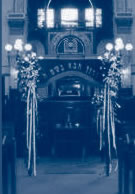|
SEDRA : Vayera: Hertz Chumash p. 63 Genesis
Chapter 18 Verse 1
This week's Sedra is generously sponsored by Phil Levy
SYNOPSIS:
While recovering from Brit Milah, Abraham was visited by three men, who in reality were angels. Abraham extended them the utmost hospitality. When one of the angels informed him that Sarah would bear a son, Sarah laughed for she was well beyond child-bearing age.
After the three angels departed, G-d informed Abraham of his intention to destroy the two cities, Sodom and Gemorrah, and their surroundings because of the wickedness of their inhabitants. Abraham prayed, arguing with G-d not to destroy the cities if a certain number of Zadikim -- righteous people -- could be found within them. G-d eventually said he would accede to Abraham's prayer, even if there were only ten righteous people.
The three `men' arrived at in Sodom toward evening and Lot persuaded them to come to his house. They were treated very badly by the local people, while Lot did his best to protect them. The visitors' reception in Sodom confirmed that all its people, except Lot, were wicked. The visitors ordered Lot to take his family and to flee to safety to Zoar, a small nearby city.
A deluge of sulphur and brimstone pelted down and destroyed the cities of the Jordan Valley. Lot's wife paid no heed to the angel's warning not to look back, turning into a pillar of salt as she did so. Lot and his daughters found refuge in a cave. There the daughters, fearing that all humanity had perished, conceived from their father. Each gave birth to a son, who became the fathers of two nations -- Moab and Ammon.
Abraham then journeyed and settled in Gerar. There he again passed off Sarah as his sister. She was abducted by Avimelech, the King, but following illness in his household and G-d's warning to him in a dream, Sarah was released.
The angels' promise was fulfilled -- Sarah gave birth to a son. He was named "Yitzchak" (he will laugh) because Sarah laughed at the prediction of his birth a year earlier. Isaac had his Brit when he was eight days old. Ishmael's behaviour towards Isaac greatly angered Sarah. G-d commanded Abraham to heed Sarah's demand that Hagar and her son Ishmael be sent away.
Hagar and Ishmael wandered in the desert around Beer-Sheba and soon ran out of food and water. An angel appeared to Hagar bidding her not to despair for her son would survive and have a great future. Ishmael settled in the desert and eventually married an Egyptian woman.
We read further of the pact which Abraham made with Abimelech, King of the Philistines, the King of Gerar. Though Abraham rebuked Abimelech over the well which his shepherds seized from Abraham, the two, nevertheless, made a covenant of friendship.
Abraham's greatest trial, the Binding of Isaac and his readiness to carry out G-d's command, testify to his total, absolute and uncompromising loyalty to G-d. G-d commanded Abraham to sacrifice his son Isaac, the only child from his wife Sarah, who was destined to inherit and perpetuate all the promises which G-d had made to Abraham. Despite the disappointment and the deep pain, Abraham made all the preparations for the sacrifice and took his son to the place which G-d designated.
As Abraham raised his knife, ready to slaughter Isaac, an angel called out to him not to harm him. A ram, whose horns were caught up in a thicket, appeared and was sacrificed in place of Isaac.
G-d's messenger, the angel, praised Abraham for his outstanding faith and repeated, in
G-d's name, all the promises previously made to Abraham, reiterating that all the promises would be fulfilled through his son Isaac -- his legitimate heir.
(Adapted from : Mena Kozminsky, Study Guide to"Genesis").
HAPHTORAH
HERTZ CHUMASH P. 76 2 Kings 4, 1-37
The simple connection with the Sedra is that the haphtorah also deals with a woman whose infertility was alleviated. The fact that the prophet was recently widowed is only referred to in passing. In fact both these topics relate to the Sedra. Both speak of a destitute woman who is miraculously helped, challenging those who would laugh (Yitzchak) at such "unnatural" occurrences.
TELL ME RABBI ... THE T'NA'IM - ENGAGEMENT CONDITIONS
Traditionally engagement is legalised by signing the Conditions of Engagement, the t'na'im or t'na'ay shiduchin at a festive meal, usually at home and attended by family, close relatives and friends. A formal ceremony for signing a contract sets the wedding date and other conditions including the venue of the wedding, financial undertakings (of the parents), a dowry, if any, the provision of a home for the couple, the monetary support or continuing an education. The contract also contains a penalty clause for non-compliance.
The t'na'im are signed by the couple, then read aloud by the rabbi, and the couple are both given copies. A kinyan, or formal acknowledgment of the agreement, is also performed. The kinyan is celebrated by the singing and the presentation of rabbinic discourses, divrei Torah, that make the occasion a seudat mitzvah, a special feast, participation in which is considered a mitzvah.
Among Ashkenazic Jews the event culminates when the two mothers jointly break a porcelain plate wrapped in a cloth, to the shouts of "mazal tov!". In some circles, pieces of the plate are distributed among the bride's single girl friends, or they may be fashioned into jewellery before distribution. Breaking the plate symbolises the impossibility of joining a couple together if the agreement to marry is breached. Indeed, a breach of t'na'im is considered a reprehensible breach of contract. The Gaon of Vilna declared it better to write a gett (a letter of divorce) than not to fulfil the t'na'im.
Nowadays, because of the consequences of a breach, t'na'im are often drawn up immediately preceding the marriage ceremony limiting the possibility of infringement.
Alternatively the t'na'im are written at the engagement celebration, with details intentionally vague. The phrase kim'dubar, "as agreed," is inserted in the appropriate places and used in the penalty clause, without further amplification. The wedding date is also vaguely stated eg. "when the parties decide".
In many traditional circles t'na'im are not written at all. Instead, a festive ceremony similar to that of the t'na'im is held and an informal oral agreement called a vort is substituted for the written, contractual t'na'im.
BACK TO SHABBAT SHALOM
TABLE
|








